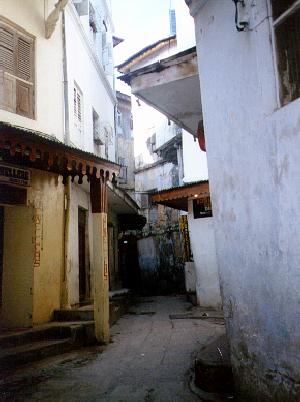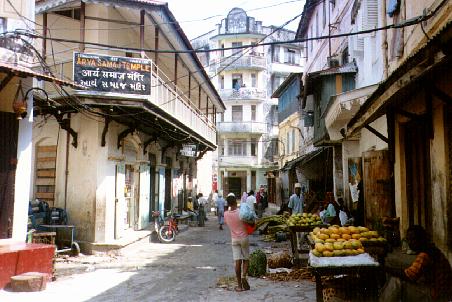|

|
Consultancy & Special Projects
Tanzania
|
|
The annals of Zanzibar read like a chapter from The Thousand and One Nights and doubtless evoke many exotic images in the
minds of travelers. Otherwise known as the Spice Island. Zanzibar’s old Stone Town is a fascinating labyrinth of narrow,
windy streets lined with quaint little shops, bazaars, mosques, courtyards and squares, former colonial mansions and
whitewashed, coral-rag houses, many with overhanging balconies and magnificently carved brass-studded doors. Scuba
diving has taken off in a big way on Zanzibar with its numerous beautiful coral reefs.

|
|
|
Gombe Stream Park is primarily a chimpanzee sanctuary and is the site of Jane Goodall’s research station, which was set
up in 1960. There can be only few people who have never heard, read or seen on TV footage of the incredible 20-km wide
volcanic crater in Nogorongoro Conservation Area with its 600 m walls packed with just about every species of wildlife
to be found in east Africa. On the seemingly endless and almost treeless plains of the Serengeti are literally millions
of hoofed animals. Nowhere else will you see wildebeest, gazelle, zebra and antelope in such concentrations. From
February till March the Tsetse flies are a pest, so keep your windows of the car closed.
Climbing Kilimanjaro by the Machame-Mweka route
Climbing Kili can be an awesome experience - it's a BIG mountain. There are alot
of people on the hill and the numbers are really noticeable in the camp
sites. On the trail everyone goes along at a snails pace so you don't pass/get
passed by many people, aside from porters of course. A 6 day trek helps acclimitisation. As for the Arrow glacier route,
there are fewer people on it, but rock falls are common and it is only the summit part of the route which is different to
the Machame route.
The weather in August is about 12 degrees centigrade and quite windy. If you have a down jacket take it! You walk so
slowly that you need as many layers as you can to keep warm. Wind proof trousers are also a bonus.
Dar-es-Salaam:
Dar-es-Salaam (Dar As-Salam), once was just a small fishing village. It gained importance in the mid-19th century, when
the Sultan of Zanzibar transformed it into a port and trading center. Since then, it has been growing continuously. It
came under German control after they established a station there in 1887. Afterwards, it became the capital of German
East Africa, then of Tanganyika in 1961 when it gained independence, and ultimately of Tanzania. Dar-es-Salaam is an
important industrial and transportation center, as agricultural and mineral exports pass through its port.
Economy:
The economy is heavily dependent on agriculture (primarily, coffee, cotton, tea, cashew nuts, sisal, maize, rice, wheat,
cassava, and tobacco), which accounts for about 50 percent of GDP, provides 85 percent of exports, and is by far the
largest employer. Cattle raising and farming are important economic activities. Topography and climatic conditions,
however, limit cultivated crops to only a small fraction of the land area. Important industries are wood and furniture,
beverages, processed food, milled rice and flour, soap, and oil. Industry accounts for some 15 percent of GDP and is
mainly limited to processing agricultural products and light consumer goods. The mining sector has good potential, but
has yet to be fully developed. Tourism is one of Tanzania's dynamic sectors and has shown significant growth in recent
years. The service sector and the informal sector are an increasingly important source of employment. Dodoma is the
market for peanuts (groundnuts), castor beans, sunflower seeds, gum, corn (maize), rice, wheat, coffee, tea, tobacco,
and sorghum. Coffee and sisal are grown in the north.
PricewaterhouseCoopers: Serving you in
Tanzania.
History:

Former President
Mwalimu Julius Nyerere
|
|
|
Mainland Tanganyika and its island neighbor Zanzibar, located in eastern Africa, became independent in December 1961
and December 1963, respectively. In 1964 the two formed a union known as the United Republic of Tanzania. The president
of Tanganyika, Mwalimu Julius Nyerere, became the first president of the Union.
|
Following the Arusha Declaration in 1967, Tanzania launched a socialist development agenda with broad state controls.
These policies provoked a long-term economic downswing and macroeconomic imbalances, resulting in a decline in living
conditions for Tanzanians. In 1986 the newly-appointed Mwinyi Government embarked on a broad-based Economic Recovery
Program supported by the International Monetary Fund (IMF) and the World Bank. This was reinforced by an Economic and
Social Action Program in 1989. Under these two programs, Government worked to dismantle the system of state controls
and promote private sector expansion--including liberalizing the trade and exchange system, eliminating price controls
and most state monopolies, and opening the financial sector to private sector participation. Rehabilitation of key
infrastructure was also made a priority, particularly roads, railways, and ports. The economy responded to these reforms,
recovering at an annual growth rate of 4 percent over 1986-94. In 1995-96, however, Tanzania's progress was jeopardized
by a significant deterioration in macroeconomic management, in part due to weakened commitment to reform during President
Mwinyi's second term. The worsening macroeconomic situation led to deferment of World Bank and IMF programs and an
interruption of balance of payment assistance from several donors. The Mkapa Government , which came into power in
November 1995, represented a break with the past and the President moved quickly to reach agreement with the IMF.
The subsequent adherence to the IMF fiscal program has resulted in satisfactory economic performance. Tanzania continues
to enjoy political stability, and has assumed a leadership role in regional cooperation under President Mkapa. After
three decades of one-party rule, multi-party elections were held at the local level in late 1994, and presidential and
parliamentary elections in late 1995. The ruling Chama cha Mapinduzi Party (CCM) won both presidential and parliamentary
elections. Next elections are to be held in October 2000. Over the past five years, the government has made efforts to
fulfill its election pledge to fight corruption and to continue policies emphasizing economic stability and liberalization
aimed at growth and poverty reduction.
Enabling us to improve the quality of the content, if you have additonal information, remarks or suggestions, please
share it with us by e-mail.
DAR ES SALAAM, 21 March 2002: Kilimanjaro, the highest mountain peak in Africa and to many a source of pride
and identity, is in the middle of a heated argument over its melting ice cap. Scientists announced to the world last
year that the beautiful snow and ice fields will disappear altogether in 15 years' time. The first alarm was sounded
in February 2001 by Professor Lonnie Thompson, a geologist from Ohio State University, US, who has studied ice fields
on tropical mountains for the last 20 years. He made several aerial surveys of Kilimanjaro and found that a third of
the snow has disappeared in the last two decades. Thompson warns that if Kilimanjaro's ice continues to melt, there
could be serious repercussions for the mountain's local inhabitants and the country's tourist industry. Over one million
villagers live at the foot of Kilimanjaro and depend on its springs for drinking and irrigation water. The disappearance
of the ice could only mean drought and thirst for human beings, livestock and crops. The mountain also attracts more
than 20,000 tourists every year, mainly from the United States and Europe.
ARUSHA, October 2001: Five regions in Tanzania are threatened by famine following a rodent invasion that has
destroyed several hectares (acres) of crops and seeds in farms and barns, a government official here Tuesday. "The
rodents are multiplying at an alarming rate in some regions, where a house can host up to 300 or 400 rats. It is
alarming," an agriculture ministry official, who requested anonymity
told AFP. The official said he was not in a position to know how many tonnes of crops have been destroyed so far
in the affected regions of Arusha, Iringa, Singida, Tabora and Ruvuma, which cover over a fourth of Tanzania's land
area. He said the awesome presence of large armies of rats was first noticed about two months ago and the government
immediately responded by sending pesticides. The prime minister's office confirmed Tuesday that it was aware of the
threat from the rodents. "The prime minister (Frederick Sumaye) was briefed on the situation recently," Sumaye's
press office told journalists. In Tabora region's Igunga district, rats have eaten cotton, maize grains and other
foodstuffs and even gnaw at people's toes. "It is risky sleeping without washing your toes here," they say in Arusha.
VISITOR TIPS from the Africa Travel Newsgroup
To Zanzibar: Be sure to have dinner at Emerson's and Green's (aka 'New Emerson's) at
least once - it's a real experience. Although it seems odd, you book through
your own hotel's reception. Chumbe Island is also worth a visit.
Legho Motel in Singida is about $18 for a single. It has clean rooms, hot water, good bed with mozzie net, friendly
but slow service. (Marc Lurie)
The New Mwanza Hotel is pretty good, and the Indian food in the restaurant is outstanding. The cost is about $80 for
a single, and the standard is in line with other hotels of similar price. (Marc Lurie)
The Lake Motel in Bukoba cost is around $20 for a double for a clean room, mozzie nets, hot water. The hotel is quiet,
and very pleasant. The restaurant is well priced, and
the food is great. (Marc Lurie)
Using a Carnet de Passages for a South African registered vehicle is definitely the correct thing to do for Tanzania
and Uganda. It is not necessary to use the Carnet for Zambia or Zimbabwe. (Marc Lurie)
Diesel is much more readily available than petrol, and cheaper. A litre of diesel currently costs around $0.50 in South
Africa, $1.10 in Zimbabwe, $0.90 in Zambia, $0.80 in Tanzania, and $0.75 in Uganda. Diesel is not available in many
places in Zimbabwe, so ensure you have enough to reach the border and beyond. (Marc Lurie)
Don't make the mistake of thinking that you should just change enough money for the trip ahead and immediate needs.
There are many areas in Tanzania where your Dollar bill means as much as toilet paper to the locals. I always changed
double the amount of money that I
expected to need. That way I always had enough money, in local currency, to cope with unforeseen circumstances. Excess
local currency can usually be exchanged when you leave the country. Don't rely on Credit Cards. Most places don't accept
them. (Marc Lurie)
Last update: 25 April 2008
|




